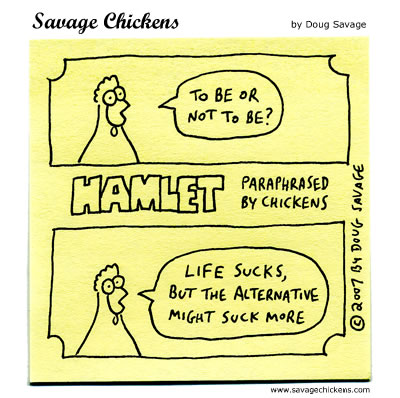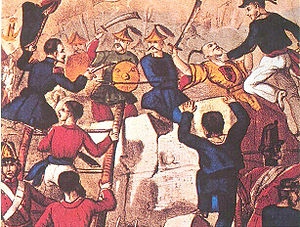The Passage or Poem:
Usually these essays ask for analysis of literary techniques, and the author's purpose (tone) in their prose or excerpt. Common inquiry includes characterization, thematic focus, diction, structure, and choice of details.
Characterization - the creation of the image of imaginary persons in drama, narrative poetry, the novel, and the short story. Characterization generates plot and is revealed by actions, speech, thoughts, physical appearance, and the other characters’ thoughts or words about him.
The etymology and derivation of the word are the same as those for character.
In Mark Twain’s Huckleberry Finn, Huck’s use of dialect, running away, his guardian’s feelings about him, and Jim’s response to him all comprise Twain’s characterization of his protagonist.
Thematic Focus- an abstract idea that emerges from a literary work's treatment to subject matter. Themes include love, war, sacrifice and struggles both internal and external.
Diction - The word choice in writing or speech. Most effective in providing a purpose. Diction is often utilized to illicit an emotion from the reader. We shall go into further depth on this particular device, because purpose of diction can often seem ambiguous when scrambling to directly address it from the perspective of the essay question.
Some examples of diction are:
- "There's a hell of a distance between wise-cracking and wit. Wit has truth in it; wise-cracking is simply calisthenics with words."
(Dorothy Parker, 1956) - Note: In describing the difference between wise-cracking and and wit, our mind perceives both negative and positive connotations of words that should by all accounts possess the same meaning.
- If you remember the discrepancies outlined in Robert Grave's poem, "The Naked and the Nude", he references the moral scope of naked "anatomy" and nude "sly" or cunning. In this case naked is clinical, pure, and he references the "hippocratic eye" of the physician. The nude twist with "rhetoric" and "treason".
You want to accomplish a few key things first!
- Annotate the passage and focus on the question.
- Outline your essay before beginning. A good technique for this is the use of Roman Numerals to separate the sections. For example
I. Introduction- Thesis. (Blah blah blah some profound statement that takes an assertive position on the essay question)
II. Body
a) Literary Technique 1
b) Literary Technique 2
c) Literary Technique 3
With each of these literary techniques, it is important to tie it back to the thesis, and make sure to provide examples from the text to develop your ideas.
III. Conclusion. Make it powerful! Make it direct! Hit 'em in the gut! Tie everything together and reiterate the thesis again. It really helps if you make the conclusion close all loose ends. Extra points if it sounds more coherent than the introduction!
Analyzing the Text!
When figuring out the meaning behind words you don't know, don't hit a psychological wall. Instead, use the words around the situation in the passage as it is described.
For example: "they knew not whether ill health were robbing his spirits of elasticity, or whether a canker of the mind was gradually eating, as such cankers do, from his moral system into the physical frame, which is but the shadow of the former. "
In this case, canker and elasticity may pose a problem for the reader in discerning their meaning. However, we can understand that canker is an illness and that it shook him both spiritually and physically due to his wife's demise. A clue to its meaning lies in its similarity to cancer. If his spirits can't hold form then they cannot keep their elasticity.
This is contextual understanding. This develops when someone is well-read. When you're well-read you have more situations and contexts to develop your ideas from and draw comparisons between. However, mentally sounding out phrases that strike you as you skim them will help you find the means to meaning. When taking any literary exam this is crucial and extends on the SAT as well. If you've seen a lot of movies its dialogue also helps, despite what your teacher may tell you ;).
*** Whatever happens, finish your essay. You have 45 minutes to organize your ideas clearly and concisely. The 5 Paragraph Essay is dead as it pertains to the AP exam. You CAN write them, but it can be as long as you want. The most important thing is that you FINISH and relate everything to what is asked of you. Avoid summarizing the plot if it does not serve a purpose towards your thesis.
Sources
"Guide to Literary Terms: Characterization." eNotes: Guide to Literary Terms. Ed. Penny Satoris. Seattle: Enotes.com Inc, October 2002. eNotes.com. 29 April 2010.
http://www.cs.berkeley.edu/~richie/poetry/html/poem116.html







